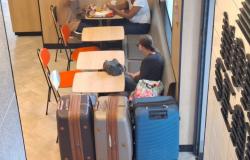
Mission with technicians, researchers and producers seeks local reality for the application of the Pantanal Law
With 20 people from the Government of Mato Grosso do Sul, researchers and rural producers, the Pantanal Expedition group arrived on Tuesday (26) on the third day of their journey into the biome. The mission seeking subsidies for the application of the Pantanal Law began on Sunday (23). The latest discussions highlighted the difficulty in accessing education and health that generate social impacts, according to the Executive Secretary of the Environment, Artur Falcette.
With 20 people from the Government of Mato Grosso do Sul, researchers and rural producers, the Pantanal Expedition group arrived on Tuesday (26) on the third day of their journey into the biome. The mission that seeks subsidies for the application of the Pantanal Law followed trails, but the main discussions were around the difficulties in accessing basic services, such as health and education, which make families leave the area, according to the Executive Secretary of the Environment , Arthur Falcette.
The group that has already passed through the Santa Cruz and Santa Fé do Corixinho farms, arrived at the Santa Clara farm, where they spent the day meeting with pantaneiros, in addition to traveling on trails and stretches to experience the daily lives of the residents, recognizing the biodiversity Of region.
There, the expedition experienced a production system very different from that seen in previous days, but the main points that guided the discussions were the social impacts of difficult access to basic services, such as health and education, which generate the exodus, that is, make families abandon the Pantanal, according to the executive secretary.
“We talked a lot about health, education and we talked a lot about infrastructure and the importance of all these aspects in the settlement of Pantanal men and in the settlement of Pantanal families, who have suffered with the exodus of their workforce and Pantanal residents and this is very stimulated because women and children need to go to the city to have greater well-being due to the long distances and the difficulty in accessing education and health. This has strongly impacted the social structure of the Pantanal”, reported the secretary.
Road map – In total, more than 230 kilometers will be covered. This Wednesday (27), the group visits the Cocais farm, a breeding unit, located in the center of Nhecolândia with a predominance of native fields. After lunch, they will go to Pousada Santa Clara, walk trails, passing through several farms, and the Leilão Novo Horizonte.
On Thursday (28) and the last day, the program includes a trip to the São Bento, Bodoquena and Las Palmas farms. Located in the Abobral wetland, the São Bento farm has predominant breeding activity, rich in native pastures, with a recurring incidence of forest fires with diverse origins and is located on the banks of the Miranda River and Abobral River.
Next to the old Carandazal Railway Station, the Las Palmas farm is a full cycle farm, in the Serra da Bodoquena range, with phytophysiognomy characteristic of the Nabileque Pantanal and Chaco influence.
A farm founded in 1846, the Bodoquena farm carries out a complete cycle, predominantly breeding in native pastures, with intensive finishing and confinement and is now beginning a project to verticalize production, with severe aromite infestation.
Pantanal Law – With a fund of R$50 million, the law came into force in February, but will still be regulated. Among the various changes foreseen in the new legislation, which will protect around 9.7 million hectares of the biome in the Mato Grosso do Sul territory, is the need for rural landowners to preserve 50% of the area with forest and Cerrado formations. Where there are rural formations, the percentage will be 40%.
The law also provides for the creation of a state fund, the Pantanal Climate Fund, for payment programs for environmental services. The priority will be for the protection and recovery of springs and vegetation cover in degraded areas that are important for the formation of ecological corridors.
Tags: Difficulties lead exodus Pantanal topic #3rd day expedition Environment
--




